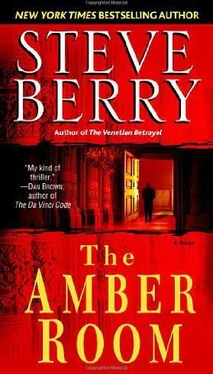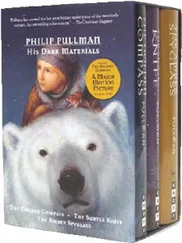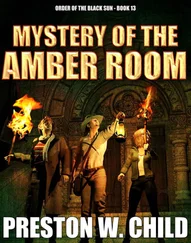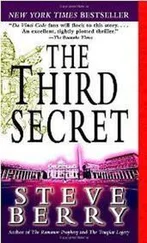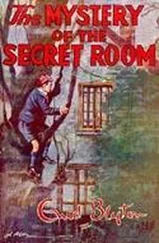"We don't know," she said. "All we're sure of is the woman killed Chapaev and Knoll killed my father."
"How do you know that?"
She told him what happened.
"I couldn't hear all of what Grumer and the woman were saying in the church," Paul said. "Only little bits and pieces. But I think one of them--Grumer, maybe--mentioned the Amber Room."
McKoy shook his head. "I never dreamed things would go this far. What the crap have I done?"
Paul said, "What do you mean, done ?"
McKoy said nothing.
"Answer him," Rachel said.
But McKoy stayed silent.

McKoy stood in the underground chamber, his mind a swirling montage of apprehension, and stared at the three rusted transports. He turned his gaze slowly to the ancient rock face, searching for a message. An old cliche, if the walls could talk , kept racing through his mind. Could these walls tell him more than he already knew? Or more than he already suspected? Would they explain why the Germans drove three valuable trucks deep into a mountain and then dynamited the only exit? Or was it even the Germans who sealed the exit? Could they describe how a Czech industrialist breached the cavern years later, stole what was there, and then blasted the entrance shut? Or maybe they knew nothing at all. As silent as the voices that had tried through the years to forge a trail, only to find a path leading to death.
Behind him, footsteps approached through the opening from the outer gallery. The other exit from the chamber was still stuffed tight with rock and rubble, his crews yet to start any excavation. They wouldn't until tomorrow at the earliest. He glanced at his watch and saw that it was nearly 11:00 A.M. He turned to see Paul and Rachel Cutler emerge through the shadows. "I didn't expect you two this early. How're your heads?"
"We want answers, McKoy, and no more stalling," Paul said. "We're in this whether we, or you, like it or not. You kept wondering last night what you'd done. What did you mean?"
"You don't plan to take Knoll's advice and go home?"
"Should we?" Rachel asked.
"You tell me, Judge."
"Quit delaying," Paul said. "What's going on?"
"Come over here." He led them across the chamber to one of the skeletons embedded in the sand. "There isn't much left of what these guys were wearin', but from the scraps the uniforms appear World War Two vintage. The camouflage pattern is definitely U.S. Marine." He bent down and pointed. "That sheath is for an M4 bayonet, U.S. issue from the war. I'm not certain, but the pistol holster is probably French. The Germans didn't wear American issue or use French equipment. After the war, though, all sorts of European military and paramilitary used American-issue stuff. The French Foreign Legion. Greek National Army. Dutch Infantry." He motioned across the chamber. "One of the skeletons over there is wearing breeches and boots with no pockets. Hungarian Soviets dressed like that after the war. The clothing. The empty trucks. And the wallet you found cinches things."
"Cinches what?" Paul asked.
"This place was robbed."
"How do you know about what these guys were wearing?" Rachel asked.
"Contrary to what you might think, I'm not some dumb-ass North Carolina redneck. Military history is my passion. It's also part of my preparation on these digs. I know I'm right. I felt it Monday. This chamber was breached post war. No doubt about it. These poor slobs were either ex-military, current military, or workers dressed in surplus. They were shot when the job was finished."
"Then all that you did with Grumer was an act?" Rachel asked.
"Shit, no. I wanted this place to be full of art, but after that first look Monday, I knew we had a violated site. I just didn't realize how violated till now."
Paul pointed to the sand. "That's the corpse with the letters." He bent down and retraced O , I , and C in the sand, spacing the letters as he remembered. "They were like that."
McKoy retrieved Grumer's photographs from his pocket.
Paul then added three additional letters-- L , R , N --filling in the blank spaces--and changed the C to a G . The word now read LORING.
"Son of a bitch," McKoy said, comparing the photo to the ground. "I think you're right, Cutler."
"What made you think of that?" Rachel asked Paul.
"It was hard to see clear. It could have been a half G . Anyway, the name keeps coming up. Your father even mentioned it in one of his letters." Paul reached in his pocket and withdrew a folded sheet. "I read it again a while ago."
McKoy studied the handwritten paragraph. Halfway down, the Loring name caught his eye:
Yancy telephoned the night before the crash. He was able to locate the old man you mentioned whose brother worked at Loring's estate. You were right. I should have never asked Yancy to inquire again while in Italy.
McKoy grabbed Paul's gaze with his own. "You believe your parents were the target of that bomb?"
"I don't know what to think anymore." Paul motioned to the sand. "Grumer talked last night about Loring. Karol talked about him. My father may have talked about him. Maybe even this guy here in the sand was talking about him. All I know is Knoll killed Rachel's father and the woman killed Chapaev."
"Let me show you somethin' else," McKoy said. He led them to a map lying flat near one of the light bars. "I took some compass readings this morning. The other shaft that's sealed goes northeast." He bent and pointed. "This is a map of the area from 1943. There used to be a paved road that paralleled the base of the mountain to the northeast."
Paul and Rachel squatted close to the map.
"I'd wager these trucks were driven in here through the other sealed entrance, over this road. They would have needed a compact surface. They're too heavy for mud and sand."
"You believe what Grumer said last night?" Rachel asked.
"That the Amber Room was here? No doubt about it."
"How can you be so sure?" Paul asked.
"My guess is this chamber wasn't sealed by the Nazis, but by whoever looted it after the war. The Germans would have needed to get the amber panels back after they were stashed. It makes no sense to blast the entrance shut. But the guy who came in here in the 1950s, now that bastard wouldn't want anyone to know what he'd found. So he murdered the help and collapsed the shaft. Our findin' this was a fluke, thanks to ground radar. The fact that we gained entrance, just another fluke."
Rachel seemed to understand. "Always pays to be lucky."
"The Germans and the looter probably didn't even know that another shaft passed this close to the chamber. Like you say, just dumb luck on our part, lookin' for railroad cars full of art."
"They had rail lines going into these mountains?" Paul asked.
"Damn right. That's how they moved munitions in and out."
Rachel stood and gazed at the trucks. "Then this could be the place Daddy talked about going to see?"
"It well could," McKoy said.
"Back to the original question, McKoy. What did you mean about what you'd done?" Paul asked.
McKoy stood. "You two I don't know from shit to shine-ola. But for some reason I trust you. Let's walk back outside to the shed, and I'll tell you all about it."

Paul noticed the midmorning sun as it cast a dusty hue through the shed's dingy panes.
"How much do you know about Hermann Goring?" McKoy asked.
"Just what's on the History Channel," Paul said.
McKoy smiled. "He was the number-two Nazi. But Hitler finally ordered his arrest in April 1945, thanks to Martin Bormann. He convinced the Fuhrer that Goring intended to mount a coup for power. Bormann and Goring never got along. So Hitler branded him a traitor, stripped him of his titles, and arrested him. The Americans found him just as the war ended, when they took control of southern Germany.
Читать дальше
